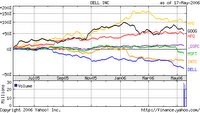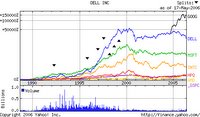What was particularly nice was his mention at the end of his piece of three pairs of companies whom I, too, have discussed recently: AMD & Intel, Google & Microsoft, HP & Dell.
However, whereas I attribute the performances to Schumpeterian dynamics, Gomes, who is primarily a technology writer, merely writes, "something seems to be in the air: Formerly bulletproof business models are fissuring under the pressure of new and unexpected competition."
Well, unexpected if you don't read Schumpeter, and/or have the benefit of my proprietary performance research using thousands of large-cap equity observations over many years. Or haven't bothered even a cursory look at the fate of top technology companies going back to even just the 1960s.

Too, Gomes only references a very short timeframe when he writes, "If you chart the stock performance of Dell vs. H-P over the past year, you get a sideways V, with the trend lines moving in opposite directions, and Dell on the bottom heading lower." He mentions the other pairs, listed above, as having similar relationships of charted performance. I've included a Yahoo-sourced chart of all pairs on the left. The S&P500, by the way, bisects the pairs, three above, three below, for the one-year view.
Now, look at a much longer term chart of the same companies, again, with the S&P500 for reference.

The slopes of the lines approximate the total returns for these stocks, as their dividends tend to be minimal. While it is clear that things never returned to pre-bubble levels for Dell, Intel, and Microsoft after 2000, the stories for the other three are by no means all alike.
What this view demonstrates is that Dell, Intel and Microsoft have taken their shareholders to places AMD and H-P have yet to go, and Google has been for a still-brief time. You have to give the former triumvirate their due for wringing tremendous shareholder returns out of a decade of dominance of the PC market.
To look at just the last year and pronounce them failures, and that 'something seems to be in the air,' is to misunderstand the fundamental nature of company and product lifecycles in technology sectors. Dell, Intel and Microsoft steamrolled their competitors in their heydays. But those days are over. And what is occurring now is by no means "unexpected."
Further, it's not like all three better performers have blunted the older business models of the now-worse-performing three firms. HP has only managed to regain traction in its markets, and to quote an old song, "been down so long, it looks like up to me." AMD has taken advantage of Intel's inability to now manage further technological hegemony in chip making with its resultant size and diversity of product/markets. But AMD languished for decades as a poor performer prior to this.
Google is the one company which represents a greenfield entry which has piggybacked on the environment created by Microsoft, Intel and Dell. But it is also the shortest-lived case of the six. I would say the jury is still out regarding the long term path Google will actually take.
In conclusion, Gomes does a nice job highlighting the recent, resulting total returns and business situations of these pairs of competitors. However, in expressing surprise, he unfortunately displays a shallow grasp of fundamental business dynamics discovered 80 years ago by Joseph Schumpeter. I think we can expect more from a featured columnist of the country's best business daily.
Don't you?
No comments:
Post a Comment